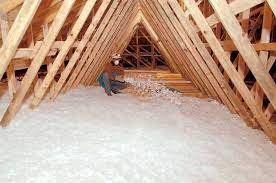
Know the Importance of Basement Insulation & Blown-in Insulation
Basements are part of a home, within the confines of the building – even as it takes much effort to separate them from the living area. Because of this, basements have to be designed and built to be dry and air-conditioned. Insulation is essential for basements that contain mechanical machinery and tools – so that they are not damaged by dampness. A dry basement or crawlspace is less likely to have bugs and termites, which is a relief. If you are thinking of using the basement for storage space or as a living place, it should be kept dry to avoid mold and dirt mites. Basements should be insulated on their perimeter and not insulated between floors.
If you are looking for high-quality basement insulation near your location, always go with a skilled and experienced insulation service provider. The professional contractors have years of experience providing residential services with their responsibilities and meeting the client’s requirements.
Why is basement insulation important?
If basement insulation is done correctly, it can save your money on utility bills and transform a messy basement into a comfortable living space. In many cases, a basement with insulation on the exterior walls is considered an air-conditioned space. The basement is more attached to the other living places than to the exterior, making basement wall insulation better than the ceiling and floor insulation.
In a new building, installing insulation to the exterior of basement walls will do the following:
- Minimize thermal bridging and lessen heat loss through the base
- Guard damp-proof coating from harm during backfilling
- Protect walls against moisture infiltration
- Minimize the chances of condensation on surfaces in the basement
- Conserve room space relative to installing insulation on the interior.
In an existing home, it is impractical to install insulation on the exterior of the basement walls. Interior basement wall insulation has the following benefits:
- It is inexpensive to set than exterior insulation for existing buildings.
- Prevents the risk of insect infestation
- Any insulation can be used.
- Greater inside temperature stability
- Prevents the floor from getting cold during winter
- Less “stack effect.”
- Fewer indoor drafts
- Reduce cooling & heating costs
Is Blown-in Insulation Good?
Blown-in insulation is always a good choice for insulation to use in your attic and less space area. This type of insulation is more workable and performs significantly well to maintain a good R-value in your entire attic insulation performance. When applied over a thick enough width, blown-in cellulose insulation can last for years; this material is also less vulnerable to mold and mildew.
If you want a Blown-in insulation service near you, always first consult a professional service to ensure that the material is compatible with your space and confirm the R-value of the material.
To ensure your insulation is installed correctly, always buy enough cellulose insulation to provide the second coating over the first coat.
This type of insulation provides better overall insulation performance than other insulation types, but it is crucial to prevent the settling of the material during the applying method.




Tried these cbd tincture in preference to bed a scattering times just now and they in point of fact work. I’m mostly tossing and turning, but with these I result up falling asleep in the way of quicker. No weird hangover feeling in the morning either. Kinda excessive, but bluntly value it when I very recently need a wholesome darkness’s sleep.